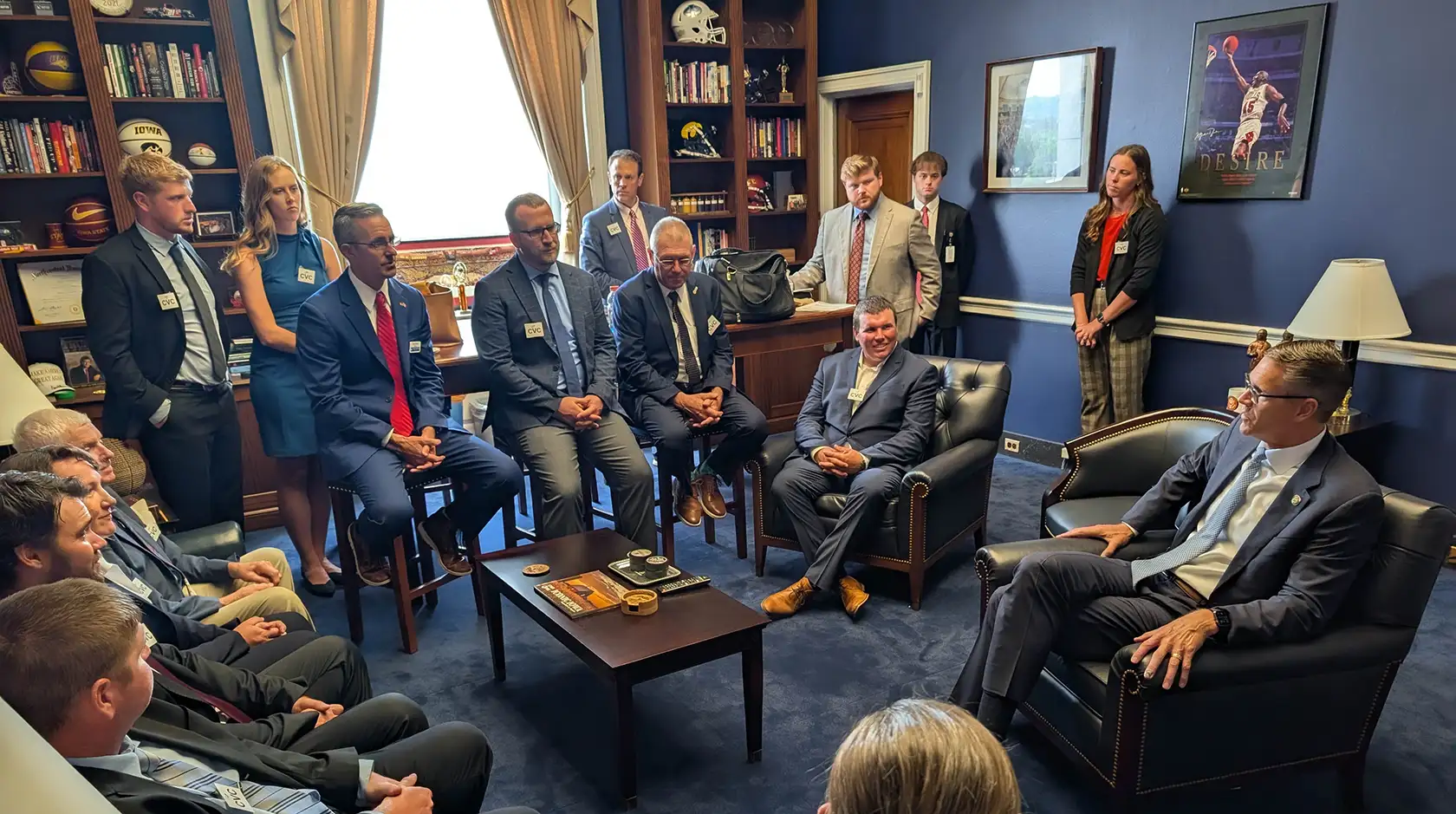
(Photo: Iowa Soybean Association / Katie Hall)
Iowa growers warn congress on trade risks and MAHA misinformation
July 17, 2025 | Kriss Nelson
Members of Iowa’s congressional delegation opened their D.C. office doors to Iowa farmers Wednesday for discussions on the farm bill, trade and the Make America Healthy Again (MAHA) initiative.
Sens. Chuck Grassley and Joni Ernst, along with Reps. Mariannette Miller-Meeks, Ashley Hinson and Randy Feenstra welcomed a group that included directors from the Iowa Soybean Association (ISA), American Soybean Association (ASA), and as participants from the ISA’s Grassroots Fellowship program.
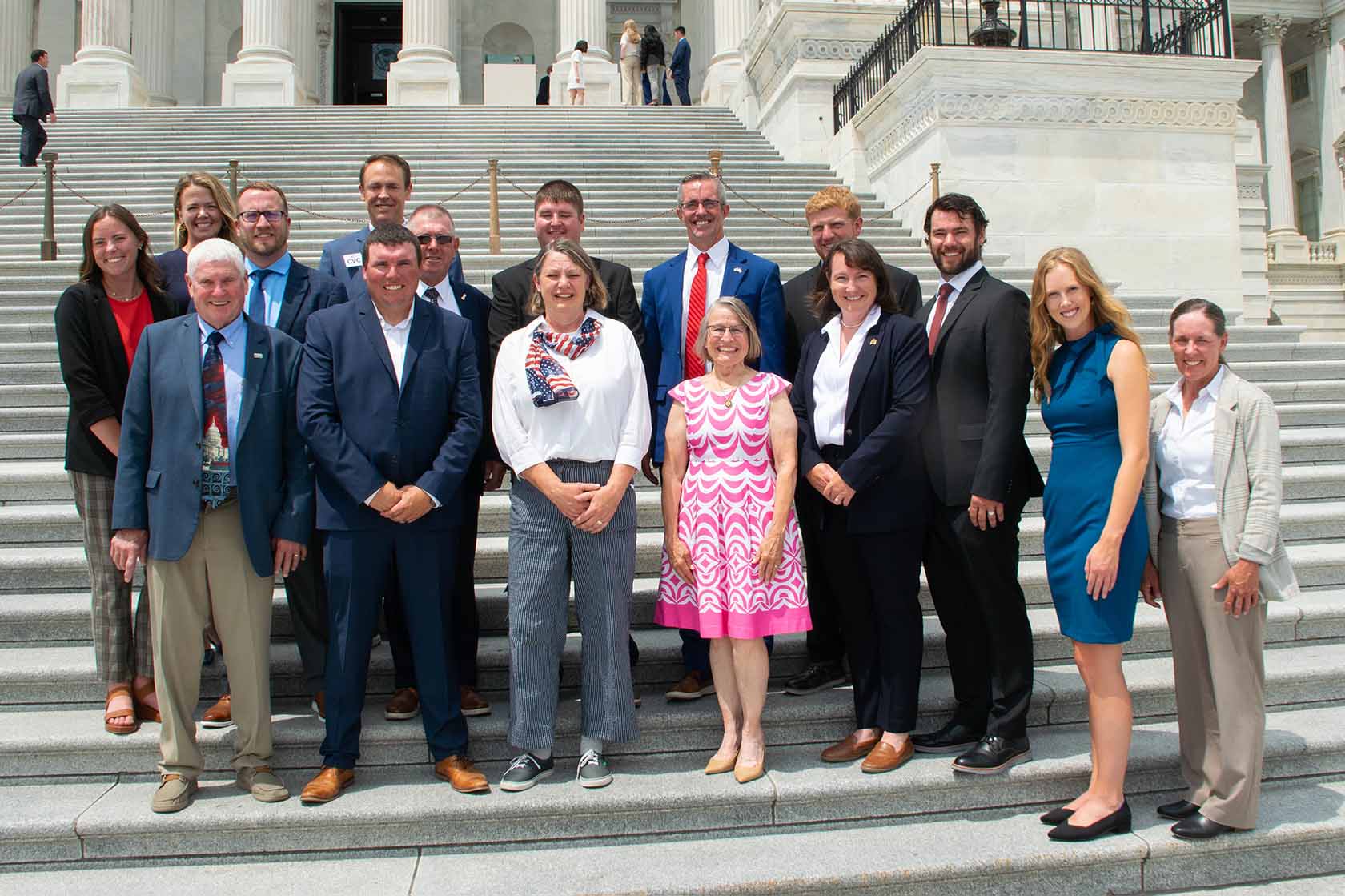
Speaking up for ag
After a full day of meetings on Capitol Hill, Iowa farmers expressed hope that their conversations with lawmakers will help push the next farm bill forward.
“We were able to share our stories with legislators, and hopefully they’ll carry those stories to their colleagues in Congress,” said Sharon Chism, ISA at-large director and farmer from Story County. She’s hopeful the personal stories from farmers will encourage the passage of the farm bill.
For many in the group, the goal is straightforward: have a new five-year farm bill in place before harvest wraps up.
“It would be rewarding if, by the time the last crop is in we had the security of a farm bill in place,” Chism added.
Chism urged members of the Iowa delegation to share what financial risks farmers take each year using an example the non-farming community can understand.
“Growers are writing checks for crop inputs that rival the price of a house in some metro areas of Iowa,” Chism relayed to D.C. office members and staffers.
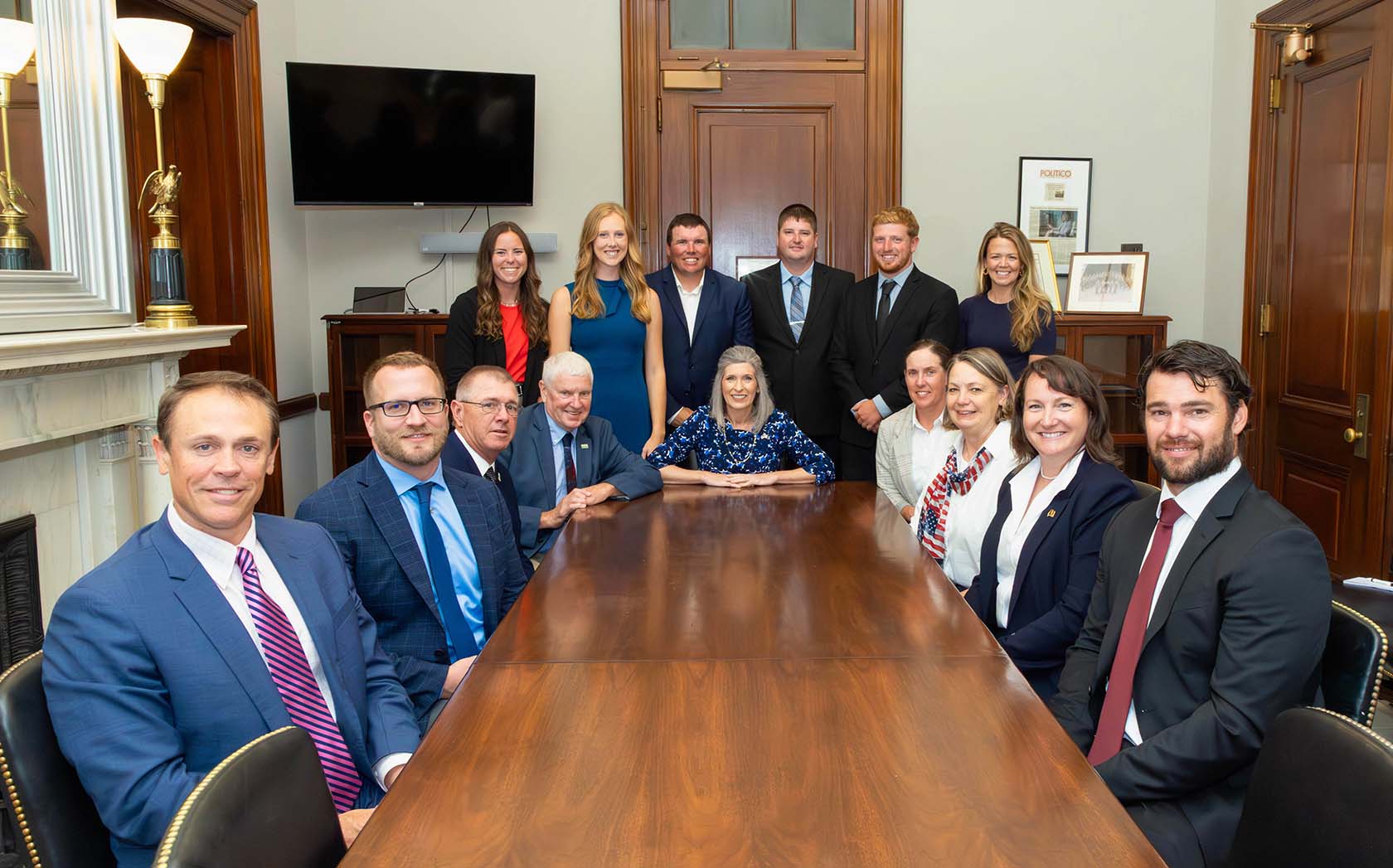
Steph Essick, ASA board member from Clay County, noted that while Iowa’s congressional delegation is familiar with issues affecting farmers, hearing directly from producers makes a real difference.
“They know our concerns, but it’s good for them to hear it directly from farmers,” says Essick, a former ISA director. “Right now, tariffs and trade are definitely top of mind. Trade is highly important to U.S. farmers, and we need to maintain and strengthen those relationships.”
Essick says maintaining open export markets is essential to the long-term success of agriculture.
“Trade matters. I know we have domestic markets, but we need to have a home for every bushel in order to have decent prices and continue farming in the future,” she says.
Morey Hill, ASA board member and farmer from Boone County, raised concerns about the potential impact of the MAHA movement, especially regarding seed oils and pesticide labeling.
“It’s all about facts,” Hill said. “Our tools, our herbicides and pesticides, were specifically called out in that first report. That just makes the target bigger on farmers. We must protect those tools.”
Hill emphasized that farmers aren’t against promoting healthier food choices but believe it must be done with reason. He pointed to the backlash against seed oils, specifically soybean oil, as an example of how misinformation can unfairly target safe, widely used ingredients.
“None of us are against eating healthier or being healthier,” Hill said. “But throwing all of that under the bus just because someone like RFK Jr. thinks it’s bad, especially when there isn’t even a clear definition for ‘ultra-processed food’ — that’s not helpful.”
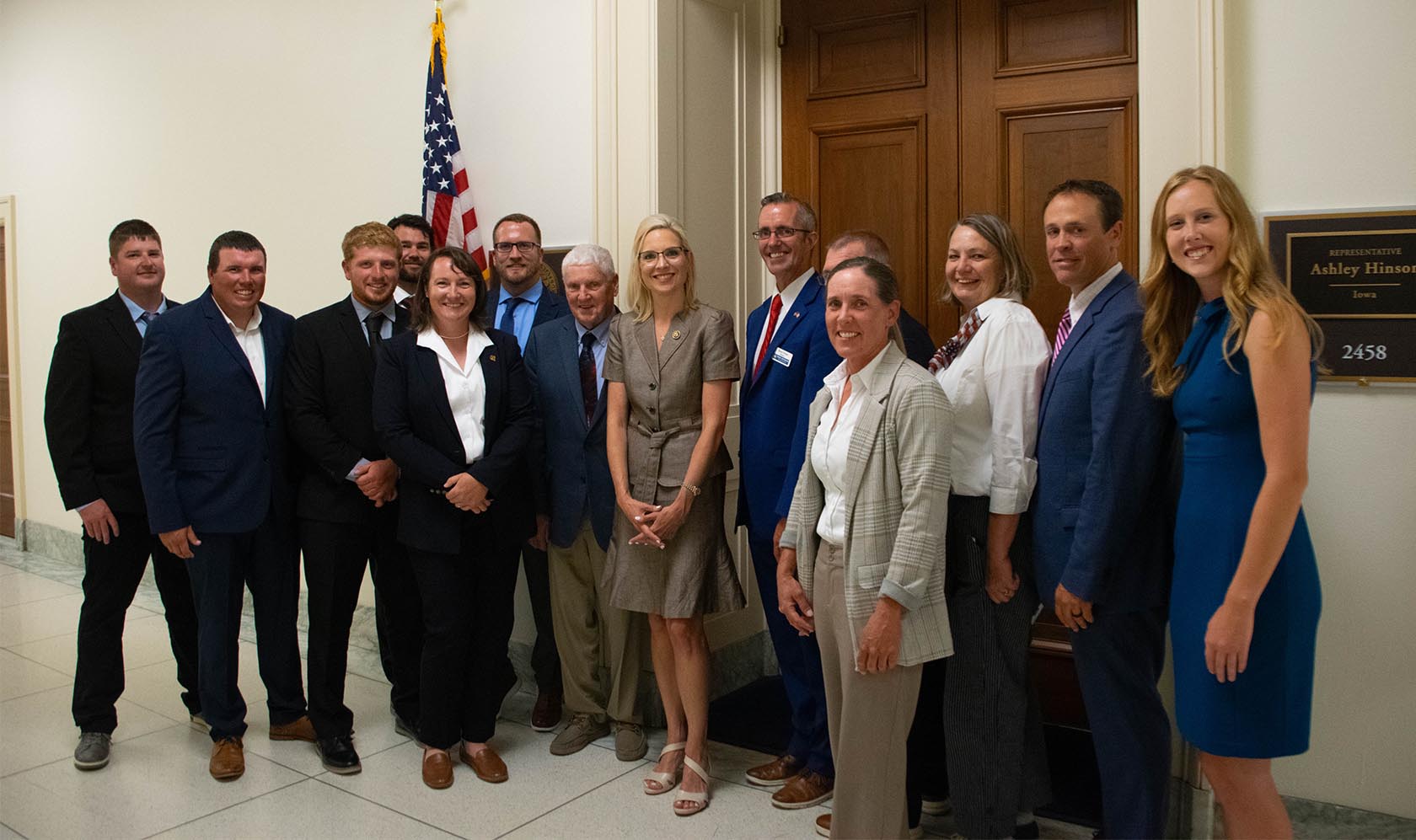
Hill spoke on how ongoing volatility continues to weigh heavily on producers.
“Uncertainty, that’s the worst. And the markets don’t like uncertainty,” he says. “The sooner we can bring some stability back, the better.”
He also noted that trust and reliability lost under the first Trump administration’s trade policies are not easily restored.
“You don’t just get that back overnight,” Hill said.
Grassley
Senator Grassley met with Iowans in his President pro tempore office. While sipping a milkshake, courtesy of Grant Kimberley, ISA senior director of market development, Grassley and his legislative assistant, Eli Harberts, chatted with the group before the Senator was called back to vote on the Senate floor.
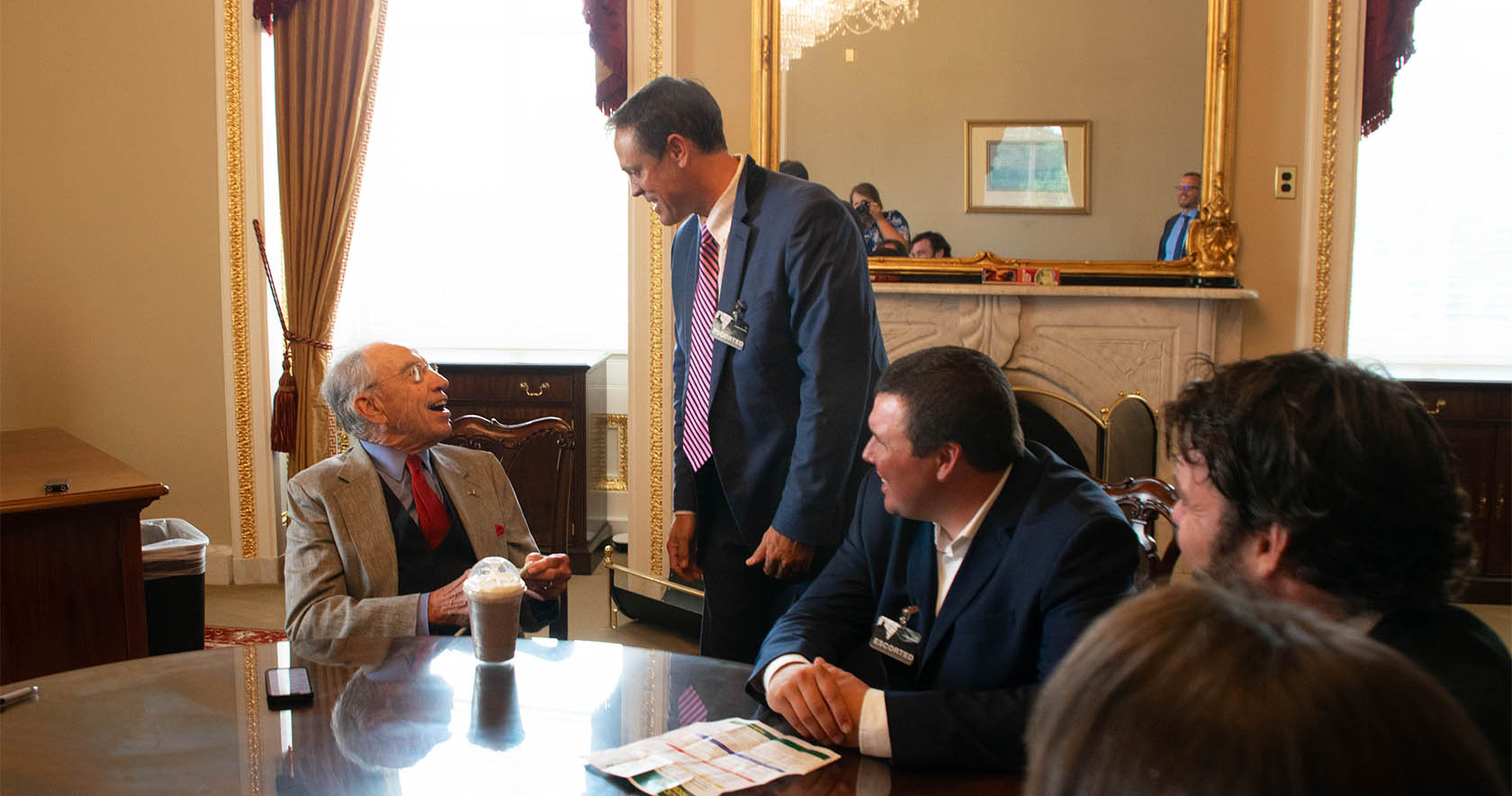
“A key focus has been making sure your voice is heard by the administration—ensuring you have a seat at the table and input with the decision-makers who matter,” says Harberts.
A long-time advocate for the biofuels industry, Grassley shared his frustration when trying to secure funding support for biodiesel plants.
“We were originally talking about $100 million to support biodiesel, and that might sound like a lot to you and me, but here in Washington, that’s not much,” Grassley says. “Meanwhile, I had a colleague pushing to include a $1.4 billion provision in the same bill. When I said no, people asked why I wouldn’t support his funding. I told them, ‘I can’t even get $100 million for something that supports rural America.’ ”
Iowa biodiesel plants, including Western Dubuque Biodiesel, paused production in late 2024 and early 2025 due to market strain and delays in federal tax credit guidance.
Senator Chuck Grassley helped get them running again by restoring the Small Agri-Biodiesel Producer Credit through 2029 and pushing for clarity on the new 45Z Clean Fuel Production Credit. He also advocated for the Renewable Fuel Standard (RFS), which has long supported domestic markets for U.S. soybean farmers. Record Renewable Volume Obligations (RVO) for biomass-based diesel volumes were announced in June, calling for an increase in biomass-based diesel from 3.35 billion gallons in 2025 to 5.61 billion gallons in 2026, a 67% increase. The combined efforts brought much-needed stability to Iowa’s biodiesel industry.
Harberts addressed the MAHA movement, saying they are hearing loud and clear that farmers do not want to be overregulated.
“Farmers, like every American, like the idea of making American healthy again. We all share those goals,” he says. “What our concerns are and what we are hearing from farmers are burdensome regulations that take away tools that do not align to Grassley’s conservative approach.”
Written by Kriss Nelson.
Back